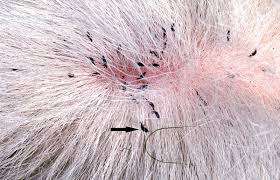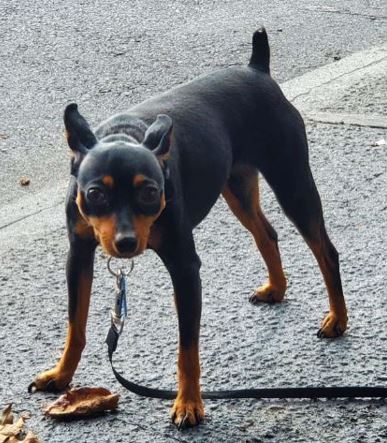Can dogs eat sausages without getting ill?
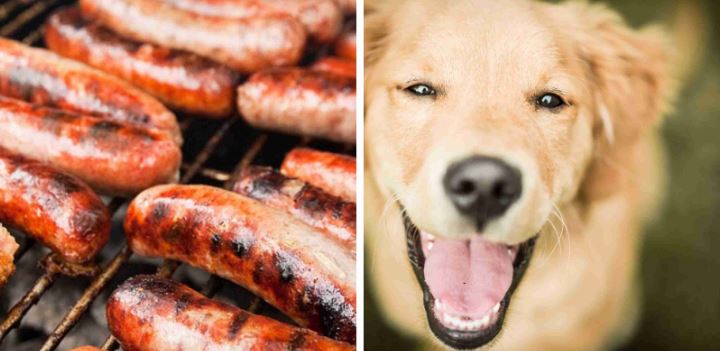
Can dogs eat sausage?
No, dogs should not eat sausage. It is however not an emergency if your dog happens to eat one sausage that might have fell from your dinner plate. It is always best for us humans and our pets to avoid oily, fatty, and salty foods, and sausage ticks all of those boxes as meat. Sausage should never be a part of a dog's diet and will cause health problems if done nonetheless.
Does your pet take a look in your direction with those wide and sad eyes, praying that you will toss a bit of sausage their way? Sure, they most likely like it, however it is never ever an excellent option to provide them with large pieces of sausage. You can securely provide a little bite, however that is just about it. If you do offer your dog a little bit of sausage, ensure that it is totally cooked, as raw sausage can trigger salmonella.
Due to the fact that sausage is high in fat, it is the primary factor sausage is bad for dogs. What would you say if you found out that most sausages can consist of up to as much as half fat? This is never healthy for any type of pet, due to the fact that it will not only cause weight problems, it will likewise cause a great deal of other health concerns, consisting of heart issues such as, diabetes and pancreatitis.
You will find that sausage is usually filled with salt, spices and other flavorings that are bad for pets. These spices can consist of garlic and onions, which are both really bad for any pet, and can trigger red blood cell damage.
Much Healthier Meat Options For Pets
Do not offer your pets those Vienna sausages you cooked for yourself. Rather, there are much healthier alternatives that dogs love that will not trigger weight problems or other heart issues when given in small amounts. There are sausage-like doggy treats you can give them that are made particularly for canines, this means that they are high in different types of nutrients.What should I do if my dog gets sick from eating sausage?
If for some reason your dog consumed too much sausage and has started to show signs of being sick such as vomiting or nausea, give your dog water as this will help to stop the body from being dehydrated from all the salt and spices that are found in sausages.
The next step would be to keep food away from your dog for the next 24 hrs for the sausage to pass. This will give the stomach enough time to settle. Be sure to fill the dog's bowl up whenever you see it go below a certain point as you do not want your dog to be thirsty while you are not around. Your dog might experience dehydration for a couple of days so it would be wise to instead have two bowls of water for him/her to drink from to be on the safe side.
Do you cook with sausage grease?
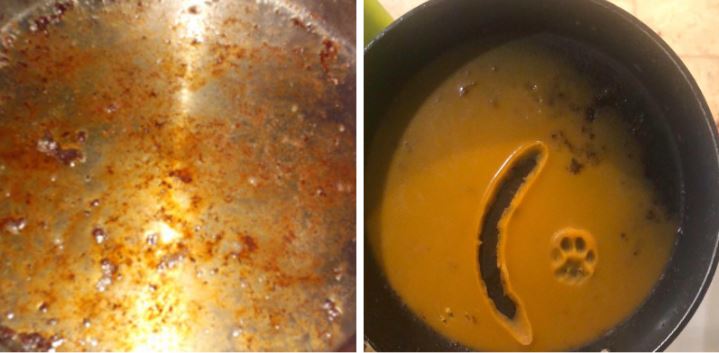
There are people in my family who likes cooking other foods with sausage grease. This food that is cooked with the sausage grease should however never be fed to your dog as this grease has made whatever you cooked more like sausage.
Possible symptoms after feeding your dog sausage
- Lethargy (this is the lack of energy and enthusiasm)
- Diarrhea
- Loss of appetite
- Vomiting
- Nausea
Feed your dogs these 5 vegetables instead of sausages
- Green Beans
- Kale
- Pumpkin
- Zucchini
- Carrots
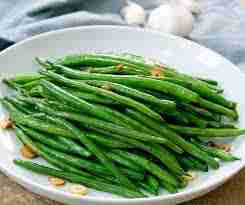
Especially great for dogs that are overweight. Dogs see green beans as treats instead of nasty vegetables like kids do.

Kale is great for humans. It is also great for dogs as it helps to maintain a healthy heart.

A perfect source of fiber to help with your dog's bowel movement.

Also a good source of fiber. Your dog will love this as the taste is like no other.

A great source of vitamin c and when given raw is a great chew toy that also cleans the teeth.
Are sausages okay for dogs?
Feeding your dog sausage should be avoided as much as possible. There are many other alternatives that are beneficial to your dog's health.
Is sausage bad for dogs?
Yes, sausage is bad for dogs as it has high salt and fatty contents. Some sausages also have onion and garlic powder included. Onion and garlic powder are bad for dogs and should not be fed. Any dog that eats onions or garlic is at risk of developing anemia. These ingredients alone should tell you all you need to know as to the question why is sausage bad for dogs.
How long after eating sausage will a dog get sick?
This all depends on the amount of sausage that your dog ate. It could be a matter of minutes if your dog ate a lot, or your dog might not get sick if he only had a small taste.
CAN DOGS EAT SAUSAGE ROLLS?
No, never feed dogs sausage rolls as they are bad for your dog's health. Sausage rolls are processed meat and usually have ingriedients that are harmful to dogs.CAN DOGS EAT SAUSAGE MEAT?
No, sausage meat and regular sausage is very close in all the ingredients they have. Sausage meat however might contain higher percentages of pork which might include a higher concentration of salts. As you may know, salt is bad for dogs.
Can dogs eat garlic sausage?

Garlic is a part of the Allium family which also includes chives, and onions. These are all poisonous to dogs but garlic is 5 times more dangerous than the others. Onion is more dangerous to cats and some types of Japanese dogs such as the the Akita. Garlic has the potential to cause damage to the red blood cells. These red blood cells will rupture and lead to anemia in your dog. Some signs of anemia in your dog are pale gums, lethargy, increased heart rate, intolerance to exercise.
Is your dog sick after eating sausage?
If your dog ever gets sick after eating sausage, the best thing to do would to try and find out how much sausage he/she has eaten. If it is more than you are comfortable with him/her eating, call a veterinarian.
The garlic poisoning signs can at times be delayed for a couple days which yours dog will more than likely not show any signs.
Diarrhea And Dehydration
Sausage, as mentioned above, can trigger dogs to have the runs or throw up. If your pet gets ill from consuming sausage, you must take away food (for roughly 24 hours). That will give enough time to the stomach to settle. Be sure to supply lots of water while you feed some type of bland food for some time. Water consumption is crucial for a serious diarrhea healing (this uses to a sausage incident). Check to see if your dog is showing any signs of dehydration. The spiciness and richness of sausage, together with the high salty content, is an unsafe mix. This can quickly cause a seriously dehydrated pet.
Can Cats eat sausage?
Just like dogs, sausage is dangerous to cats if taken in large amounts. You must avoid feeding your cat sausage and take the necessary steps to get your cat well if somehow they ingest some.
Feeding bones to your dog
Meaty Raw bones such as raw lamb ribs (however not lamb chops) and also raw lamb flaps offer a number of essential benefits to your dog's health such as keeping gums and teeth healthy.
Bones should constantly be provided raw (raw). Never ever feed your canine prepared bones as these can splinter, triggering possibly deadly internal damage or digestive blockage.
The bone should be big enough just so that the dog can not fit the entire bone in his/her mouth or swallow the whole bone. Prevent big marrow bones (these have extremely thick external rims), T-bones, 'slice' bones (e.g. lamb cutlets), bones sawn lengthwise (as done by some butchers) and big knuckle bones and as canines might split their teeth on these.
When they are consuming bones, you need to constantly monitor your pet. Pets truly like bones and can in some cases end up being protective over them, so make sure to discourage young kids and others from approaching pet dogs whilst they eat it.
Fat Factor
You have to think about the fat element if the absence of dietary worth isn't a sufficient factor to keep you from slipping your dog some sausage. Breakfast sausage can consist of approximately half fat. That's not helpful when it concerns your pet's heart health and weight, and this should be the best for keeping sausage away from your dog.
Salt and Seasonings
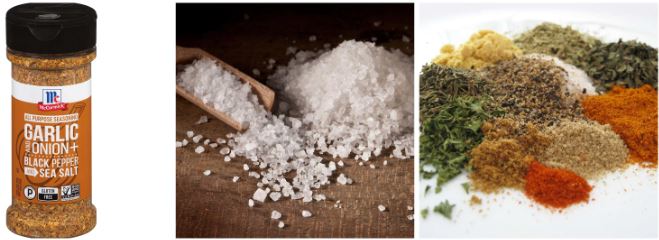
The active ingredients that offer breakfast sausage it's pleasing taste are additions your dog would be much better off without. Since canines do require salt in their diet plans to stay healthy, the Association of American Feed Control Officials requires the pet dog food makers to consist of 0.3 percent salt (sodium). One prepared sausage patty can be bad for your pet dog's heart health and kidney. Sausage typically consists of spices and flavorings like garlic and onion, both of which can trigger an upset stomach at the least or harm his red blood cells which would be one of the worst case scenarios.
Tips for dog's diet
- Animals have various dietary requirements at various times in their precious life, so pick a formula that is age-specific.
- Grain-free foods tend to be premium, so these will be more than beneficial whether your animal has allergic reactions or not.
- Dry food benefits your dog's oral health, however damp food has a greater water water content and will be easier to consume .
- There is no legal meaning in the UK for 'premium' pet food - however search for foods with with the least amount of ingredients possible
- You are not required to have a prescription for 'prescription' pet food, however it can assist in helping with urinary issues, joint discomfort and allergic reactions.
- Some human food make excellent treats for your dog, some of these are veggies and fruits like pears and apples.
Other foods
Your dog can be fed fish (such as tinned fish-- sardines, tuna or salmon) as a periodic reward, however fish must not be fed continuously. Make sure to prevent fish bones and select fish canned in sparkling water instead of oil or salt water.
Pet dogs might likewise be provided a percentage of prepared veggies such as carrots or pumpkins. Prepared meat, such as lamb or boiled chicken, might likewise be used, however make sure there are no bones that is cooked, and no onions or onion sauces, or any type of food with poisonous compounds present. A small percentage of plain, prepared rice or pasta might likewise be given.
You ought to ensure your pet has access to a grassy area (no plant that has been chemically treated with yard and harmful plants). Pet dogs will often consume turf, which might offer a source of veggie matter and micronutrients.
So what are the different types of sausages?
There are so many different types of sausages out there. Your job as a dog owner is to keep all these types of sausages away from your dog.
-
Can dogs eat Bratwurst Sausage?
-
Can dogs eat breakfast sausage?
-
Can dogs eat vienna sausages
No, they should not eat Bratwurst Sausage. This type of sausage is a German Favorite and their are more than 40 different types known.
No, a dog should not eat breakfast sausage as it is fatty, contains seasonings such as sage and pepper. And, breakfast sausage can sometimes include cured bacon and maple syrup.
No, do not feed your dog vienna sausage. Vienna sausage contains very unhealthy amount of fat and sodium, and it might contain spices that are risky for dogs. If your dog frequently consumes a large amount of vienna sausage, he might experience moderate to extreme kidney damage, digestion issues, or even pancreatitis.
Opt For Much Healthier Treats
Is chicken sausage healthier than pork sausage?
Nobody answers this question better than Mathew Gordon on Quora.
Chicken sausage is usually healthier than pork sausage but, as always, check the nutrition information on any prepackaged product. Stats I tend to look for on the nutrition information of prepackaged sausages include: calories per gram, fat per gram (saturated and unsaturated), protein per gram, and anything else that stands out (e.g.: whether the sausage has an unusually high sodium content). If you want to get really serious about your sausage healthiness comparisons, you can make an Excel spreadsheet of your favourite brands, but I don’t recommend spending your weekend that way. As with many foods, it’s all about ingredients and preparation. If you have the option of buying either from a butcher or meat counter such that it is not pre-packaged, the chicken sausage will usually be healthier.
Conclusion
Is sausage safe for dogs? No, not in large amounts. Tasting it will not cause harm, but eating it will. Feeding your dog sausage is a bad idea. Many other alternatives will keep your furry friend happy.


